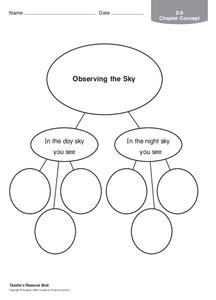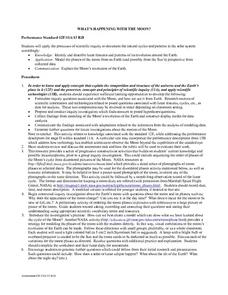Curated OER
Parts of the Universe
In this universe worksheet, students will complete a graphic organizer by writing in the different parts of the universe, including a brief description of each of these parts.
Curated OER
Comparing Earth and the Moon
In this Earth and moon learning exercise, students will complete a Venn diagram comparing the characteristics of the moon and the Earth. The Venn diagram has a fill in the blank statement in each circle with blank lines for students to...
Curated OER
Observing the Sky
In this sky worksheet, students will write down 3 things they see in the sky during the day and 3 things they see in the sky at night. This worksheet is a graphic organizer.
Curated OER
Locations of Objects
In this locations of objects activity, students solve 5 different problems that include counting objects and determining where each is located. First, they identify the location of each object. Then, students fill-in the correct bubble...
Curated OER
Watch This Space!
In this space worksheet, students, with a partner, answer five questions about the universe and read and discuss ten questions regarding astronomy.
Curated OER
Coloring Page - Wolf
In this coloring activity, students color a wolf. Students may write a story or discuss why the wolf is howling. Older students may use the picture as an illustration to a story. Students may use this a flashcard to identify animals.
Curated OER
Man on the Moon
In this art worksheet, students color in the picture of the man on the moon and create their own designs. They could create a cutout as an extension activity.
Curated OER
Moon Observation Chart
In this space science worksheet, students find the phases of the moon for each day throughout the days of the month. The information is recorded on the calendar.
Curated OER
The Moon
In this moon worksheet, students write facts they know about the moon and what they would like to know. Students color and fold this worksheet into a little book.
Curated OER
The Moon (Book in Color)
In this moon facts instructional activity, learners write facts they know about the moon. They also write questions which they would like to ask. Students fold this instructional activity into a small book.
Curated OER
Comparing The Earth And Moon
Third graders engage in a lesson that compares the Sun and Moon. They conduct research using the websites included in the lesson plan. Students read literature in order to make a connection with the new information. The plan includes...
Curated OER
How Big Are Earth, Sun, and Moon?
Third graders draw what they believe is in space on a dry erase board. In groups, they are given a beaker half filled with water and they add a teaspoon of oil, observing the different layers that form. To end the lesson, they identify...
Curated OER
Space: Stars and Planets
Students observe and report that the moon can be seen sometimes at night and sometimes during the day. They describe how changes to a model can help predict how the real thing can be altered. Students explain the essential fact of the...
Curated OER
Exploring the Night Sky: Fall/Winter
Students explain how moon phases occur. They explain three ways that the night sky has been used through history. Students locate some of the constellations in the night sky. They discuss stories and myths surrounding stars.
Curated OER
Earth and Beyond!
Learners investigate one or more of the following topics and develop a plan for the future regarding it: global warming, lunar exploration, space travel, Mars exploration, or terraforming. They disucss the audio files and the video that...
Curated OER
Moon Phases
Middle schoolers engage in a study looking for the differences found during the cycle of one lunar month. They conduct research using a variety of resources. Then the information is used to construct a lunar calendar to observe daily...
Curated OER
Night Sky
Young scholars discover why stars can only be seen at night. They participate in a read aloud of, "Night Sky" by Carole Stott and, "Switch on the Night" by Ray Bradbury. Using the sky objects described in the readings, they brainstorm...
Curated OER
Space Exploration
Sixth graders investigate the historical even surrounding the Apollo Mission to the Moon. They conduct research specifically to find information about the astronauts on the mission. The students conduct class discussion about the...
Curated OER
What's Happening With the Moon?
Young scholars review the process of scientific inquiry. Using this information, they identify the patterns and cycles of the moon as it revolves around the Earth. In groups, they model the phases of the moon from the Earth and Sun's...
Curated OER
Astronomy: Earth/Moon
Students investigate the Earth and the Moon. They select activities from a menu of options including viewing videos, drawing magnetic fields and plate tectonics, creating vocabulary flashcards, observing the phases of the moon over a...
Curated OER
Sky 4: The Moon
Students will draw the moon's shape for each evening on a calendar and then determine the pattern in the shapes over several weeks. Students' understandings should be confined to observations, descriptions, and finding patterns.
Curated OER
The Moon and The Stars
Students study the moon and the stars. They explore the vocabulary associated with the moon and the stars and cultural references including the Chinese Moon Festival. They participate in reciting poems, nursery rhymes and songs related...
Curated OER
Phases of the Moon
Students use a simple physical model of the Earth, sun, and moon to understand why the moon changes phases from the perspective of Earthly observers. They hold up balls representing the moon in a room with a single light source to see...
Curated OER
Making Impact Craters
Students examine images of Moon craters and speculate about what caused them. They create craters using sand weighted balls. Students measure crater sizes and draw ejection patterns to see what effect size, weight, and velocity have on...

























